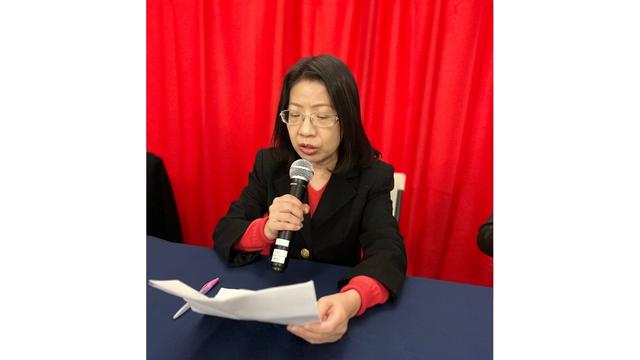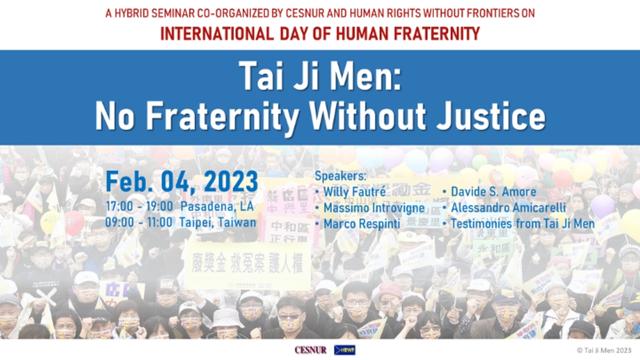A seminar in Pasadena on the International Day of Human Fraternity discussed the roots of fraternity, its connection with justice and conscience, and the Tai Ji Men case.
by Daniela Bovolenta

On February 4, 2023, United Nations International Day of Human Fraternity, a hybrid seminar was organized at the Tai Ji Men Qigong Academy in Pasadena, California, by CESNUR and the Brussels-based NGO Human Rights Without Frontiers, with the title “Tai Ji Men: No Fraternity Without Justice.”
Marco Respinti, an Italian scholar and journalist who serves as director-in-charge of Bitter Winter, opened the seminar and introduced Willy Fautré, co-founder and director of Human Rights Without Frontiers. Fautré noted that the community of scholars and human rights activists who support Tai Ji Men is in itself an example of fraternity. This is not unique, Fautré said, as civil society organizations have a crucial role in promoting global fraternity, particularly when states often fail to achieve this result. Fautré also reminded the audience that, as an international day of observance, the International Day of Human Fraternity is somewhat unique as it originated from a religious event, held on February 4, 2019. This was the date when Pope Francis and Ahmed el-Tayeb, the Grand Imam of al-Azhar University in Cairo, Egypt, and the highest scholarly authority in Sunni Islam, met in Abu Dhabi and signed the “Document on Human Fraternity for World Peace and Living Together”—which also inspired the encyclical letter by Pope Francis “Fratelli Tutti” (All Brothers), published in the following year 2020.

Marco Respinti introducing the seminar.
Respinti then presented a video where Dr. Hong Tao-Tze, the Shifu (Grand Master) of Tai Ji Men, introduced the main themes of the International Day of Human Fraternity. Hong connected the International Day and its origins in the Abu Dhabi document with the Universal Declaration of Human Rights and the United Nations Charter, as well as with the teachings about a selfless love in the great religious and philosophical traditions of humanity. He also mentioned that human fraternity requires promotion of freedom of religion or belief, interreligious dialogue, and a firm stand against discrimination and persecution of religions and beliefs.
Respinti then noted the importance of having a Muslim as a speaker in a seminar organized on the International Day of Human Fraternity, which originated from a dialogue between Muslims and Catholics, and introduced a distinguished Islamic scholar, Davide Suleyman Amore, an Italian historian of religions, a member of the Italian Association of History of Religions (SISR), and the secretary of “As-Salàm” Islamic Cultural Association, which manages a mosque where he sometimes serves as Imam.

An image of Davide Suleyman Amore, who attended the seminar via Zoom.
Amore noted that in Islamic thought fraternity cannot be separated from justice. Islam insists on community, and fraternity and justice are seen as a communal responsibility. Amore argued that the starting point of Tai Ji Men, individual self-cultivation, is somewhat different and rooted in a different spiritual culture. However, what Islam and Tai Ji Men have in common, he said, is a strong insistence on justice as the necessary root of fraternity, which also leads to denounce injustice and corruption. Amore concluded by mentioning the Tai Ji Men case as an egregious example of injustice that destroys fraternity and makes social harmony impossible.
Massimo Introvigne, managing director of CESNUR and editor-in-chief of Bitter Winter, noted that there was a third invisible participant in the Abu Dhabi meeting of February 4, 2019, the Medieval mystic Francis of Assisi, whose visit in the year 1219 to Sultan al-Kamil in Egypt was an inspiration for the 2019 event. Although Francis of Assisi was a man of his time, Introvigne said, and hoped to convert the Sultan to Christianity, he also acknowledged this might ultimately prove impossible, and hoped that his visit would at least generate a climate of mutual respect.
Francis of Assisi believed that we can all live, beyond our religious differences, in a fraternity based on shared human and moral values, i.e., on conscience. This teaching resonates with the priority of conscience advocated by Tai Ji Men, Introvigne added. It also implies denouncing corruption as a betrayal of conscience that makes fraternity impossible, as the tragedy of the Tai Ji Men case in Taiwan demonstrated, he concluded.
Respinti then introduced a short video featuring “Love of the World,” which has been since 1999 the signature song of Tai Ji Men, and the next speaker, Lien Fu-Long (Lukas), Taiwan Contact Professor at the University of Osnabrück, in Germany. Lien noted that the new Tai Ji Men Qigong Academy in Pasadena is a former Lutheran Church, and he emphasized the importance in the theology of Martin Luther of the notions of personal agency and equality of the believers. These notions, rooted in conscience, are also at the center of Dr. Hong’s message, which in fact further developed and universalized them, he noted.

Professor Lien speaks.
They should also guarantee democracy, Lien said, but real democracy is incompatible with the kind of corruption and discrimination that emerged in the Tai Ji Men case.
Lien discussed the recent participation both of Tai Jim Men and of You Si-kun, the speaker of Taiwan’s Parliament (Legislative Yuan) at the International Religious Freedom Summit of January 31-February 1, 2023 in Washington DC. Lien further reported that he participated in attempts to contact various ministries and governmental bodies in Taiwan about the Tai Ji Men case, only to discover that nobody among the Taiwanese bureaucrats seemed to be interested in hearing what he and others had to say. This, he concluded, was not a positive indicator of the health of Taiwanese democracy. While Speaker You Si-kun celebrated Taiwan’s democracy in Washington DC, a full-blown democracy there would require the solution of the Tai Ji Men case.

Huang Kun-Kuang, a retired officer of Taiwan’s National Taxation Bureau, mentioned that income tax was first introduced in the United Kingdom in 1799, and almost immediately tax bureaucrats had the temptation to invent a false income where none existed and tax it. In the case of religious and spiritual groups, including Tai Ji Men, gifts given to their leaders are not income, as Taiwan’s Supreme Court recognized but the National Taxation Bureau refused to accept. The problem, however, Huang said, goes beyond spiritual groups. He mentioned other cases in Taiwan where income was invented to apply unjust tax bills. Some of them were resolved by courts of law that declared such tax bills illegal. This also happened with the tax bills issued against Tai Ji Men. However, due to a technicality, one of them stood, although it was just as illegal as the others, and led to the auction and confiscation of sacred lands intended for a Tai Ji Men’s self-cultivation center. This was a clear mistake, Huang said, and in a healthy system mistakes should be acknowledged and corrected.
The testimonies of three Tai Ji Men dizi (disciples) from Taiwan followed. Rachel Chiang reported that she had been an attorney for four years only when the Tai Ji Men case started in 1996. Yet, even a young lawyer was able to see the exceptional amount of falsehood and slander used to build a false case against Tai Ji Men.

One positive result of these negative events, Chiang said, was that the issue of tax injustice was examined more in-depth in Taiwan than in other parts of the world. In 2012, thanks to the efforts of the Shifu (Grand Master) of Tai Ji Men, Dr. Hong Tao-Tze, and the president of the UN ECOSOC-accredited NGO Association of World Citizens, Dr. René Wadlow, the Declaration of Taxpayers’ Human Rights was issued in Taiwan. It was eventually endorsed by 111 countries.

Rachel Chiang speaks.
David Lin, an accountant, returned to the religious origins of the International Day of Human Fraternity and mentioned the roots of the idea of fraternity in the Bible and other sacred scriptures. Lin also noted that Pope Francis and Imam el-Tayeb insisted in Abu Dhabi that fraternity should prevail over religious differences. He wondered whether religious prejudices by Prosecutor Hou Kuan-Jen, who started the Tai Ji Men case, and some tax bureaucrats might have played a role in their stubbornness in persecuting the Shifu and the dizi with fabricated accusations. Lin concluded by expressing the hope that the International Day of Human Fraternity may act as a call for Taiwanese authorities to return to fraternity, justice, and conscience and solve the Tai Ji Men case.

David Lin’s testimony.
Anna Chao, an elementary school teacher, said she had learned in Tai Ji Men that fraternity is only believable if it is universal. She recalled how, when traveling with Dr. Hong to Turkey in 2019, when leaving the hotel where they had stayed, he asked the dizi whether they had expressed their gratitude to the hotel attendants. Chao would not have thought of it by herself, and that day she received another lesson about fraternity, she said. Dr. Hong teaches, Chao noted, that true fraternity is based on conscience, love, and justice. There can be no fraternity when citizens are denied justice and humiliated by bureaucrats. Often today this happens through tax injustice, Chao concluded, as dizi painfully learned in the more than 26 years of fighting for justice in the Tai Ji Men case.

Anna Chao at the seminar.
In concluding the seminar, Respinti noted that to express fraternity we often use the expression “human family.” In a way, we are all part of the same large family, and several religious traditions teach us to respect the laws of hospitality and love. Tai Ji Men dizi refer to themselves, Respinti said, as brothers and sisters. He read in a poster in the Walnut Tai Ji Men Qigong Academy the slogan “We are one family.” The history, he said, is full of counterfeits of fraternity. The French Revolution, Communism, Nazism spoke in different ways of fraternity but killed millions. Should we thus, Respinti asked himself, abandon the idea of fraternity? No, he answered: buried under layers of hypocrisy and lies a real fraternity still exists. Tai Ji Men dizi testimony to the world that living in fraternity is possible. It is time for the world, Respinti concluded, to help them to achieve justice. “Tai Ji Men: No fraternity without justice,” as the title of the seminar proclaimed.

The event concluded with a video where Tai Ji Men protests were presented with a rock and roll soundtrack, where dizi expressed their deepest feelings through music.
Source: Bitter Winter

